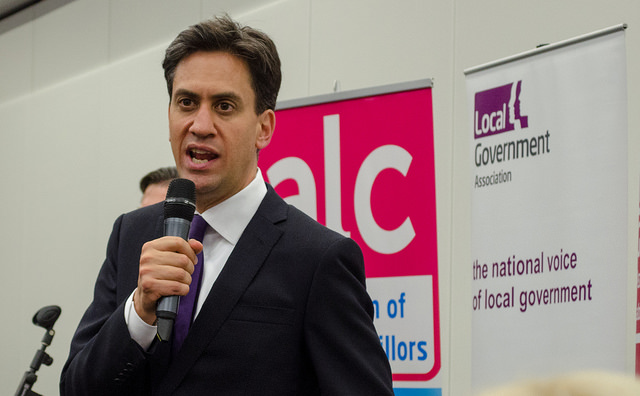Interview: Tim Bale on comparisons between Ed Miliband and David Cameron as Leader of the Opposition
Ed Miliband could be about the become the UK’s Prime Minister – equally he could be about to be consigned to history as a footnote, known only an another unsuccessful Leader of the Opposition. Sean Kippin interviewed Professor Tim Bale, author of a book on Ed Miliband’s period as Labour leader, and asked about comparisons between the two men, and what a defeated Miliband’s legacy to his party might be. This is part three of a three part interview. Part one can be found here, and part two can be found here.

What will Ed Miliband’s legacy be? (Anthony Mckeown, CC BY NC 2.0)
You were the author of a book on David Cameron’s period as a Conservative Leader of the Opposition, and now you’ve written one about Ed Miliband’s period. What are the key similarities and key differences and key similarities between the two men, and the way they’ve approached the task.
I think David Cameron originally had more of an idea of how he was going to conduct his leadership. He also had more of an idea of the phased approach he planned to take in attempting to modernise the Conservative Party, and what he was and wasn’t going to talk about. Ed Miliband, by contrast, didn’t know that he was going to win, and on top of that, he was in the fight of his life in order to win. As a result hadn’t planned his approach quite as much. As a result, despite the Fixed Term Parliament which would theoretically have made planning easier, he didn’t stage his approach in the way Cameron did.
That’s one difference. The other is that David Cameron had to undertake this enormous task of detoxification, While Ed Miliband’s poll numbers haven’t been great, and although that said, Miliband and his fellow Leadership candidates didn’t do a very good job in pushing back against the Conservatives rewriting of history which suggested that the debt, deficit, and financial crisis were all caused by Labour profligacy rather than a crisis in the world economy, the Labour Party brand wasn’t completely and utterly trashed in 2010 so he had less of a task in that regardSo he did have a simpler task that Cameron in that respect. It also has to be said that the Labour left is nowhere near as strong as the Conservative right. So there’s not been much of a sense in which Ed Miliband – at least externally – has been dragged to the left against his will. To the extent Labour has moved to the left (and it isn’t as much as people say) it has been of his own volition, rather than because he’s had to appease unhappy backbenchers. That’s a big contrast with David Cameron who has had to do that since 2005 on a range of issues, and we’ve also seen him do that in Government since 2010.
I think you can also make this comparison: David Cameron faced such a massive task in getting the Conservative Party from where it was in 2005 to get his party a majority in 2010, it’s hardly surprising that he failed. Likewise, if you look at how poorly Labour performed in 2010 – even though it won more seats than its vote share probably merited – similarly faced a mammoth task in going from where it was in 2010 to an overall majority in 2015. If Ed Miliband doesn’t make it to an overall majority but does make it into Number Ten, he should be accorded by objective observers just as much credit as David Cameron was given in managing that task. The problem for them both is that because their stints have both been defined by difficult situations, neither of them are going to be given as much credit as perhaps they ought have to have been.
Say Ed Miliband doesn’t make it into government. What do you think his legacy to the Labour Party will be?
One thing that you can say about Ed Miliband – and perhaps this has been a trade off with clarity – is that he’s kept the Labour Party essentially united. People may talk about the possibility that, post-election, his party could descend into some kind of civil war. I honestly don’t think that will happen. There will be, of course, some blame-games played. There may also be an attempt by various figures to distance themselves from his strategy if it proves to be unsuccessful. But I don’t think we’re in a situation where you have an irreconcilable Blairite wing versus an irreconcilable Brownite wing which will face off against one another in 2015. I think quite a lot of that has now been parked. There aren’t that many clear ideological divisions in the Labour Party. I think that unity he’s achieved isn’t completely superficial, and I think that can be credited to him.
It’s also true that Labour hasn’t veered off madly to the left, in the way that it did in the 1950’s and 1980s. To coin a cliché, it’s still true that elections are won in this country from the centre ground, and that’s no bad thing either. You can look at some of the promotions Ed’s made and you can say that some talented people have been brought through into the first and second rank of Labour’s ‘top team’. You’d expect some of those people to come through even more strongly after 2015. I can’t think of anyone really who can say they’ve been cruelly ignored by Miliband so he retains credit for that. There’s a positive legacy there.
The downside of Ed’s legacy would be that he hasn’t perhaps managed to really reconcile Labour to its own recent history. One of his big problems, his party’s problems, is that it hasn’t really been able to make the most of the positive parts of the New Labour legacy. In winning the Labour contest in 2010 in the manner in which he did – in effectively running against New Labour – Miliband threw out at least a couple of babies with the bathwater. That made it difficult for Labour to counter the Conservatives’ rewriting of the 1997-2010 period as “much spent, nothing achieved”, which actually isn’t true if you look at the figures and has made it far more difficult for Labour to talk positively about its time in power than it should have been.
—
This is part three of a three part interview. Part one can be found here, and part two can be found here.
Note: this post represents the views of the author, and not those of Democratic Audit or the LSE. Please read our comments policy before posting.
—
 Tim Bale is Professor of Politics at Queen Mary’s University, and a Trustee of Democratic Audit UK.
Tim Bale is Professor of Politics at Queen Mary’s University, and a Trustee of Democratic Audit UK.





 Democratic Audit's core funding is provided by the Joseph Rowntree Charitable Trust. Additional funding is provided by the London School of Economics.
Democratic Audit's core funding is provided by the Joseph Rowntree Charitable Trust. Additional funding is provided by the London School of Economics.
What will Ed Miliband’s legacy to the Labour Party be? @se_kip asked @proftimbale about this last month https://t.co/3lK4TfEDXC
How do Ed Miliband and David Cameron compare as Leaders of the Opposition? https://t.co/Hy3x37D5tA
Interview: Tim Bale on comparisons between Ed Miliband and David Cameron as Leader of the Opposition https://t.co/tHJn1Y0dhn
Interview: Tim Bale on comparisons between Ed Miliband and David Cameron as Leader of the Opposition https://t.co/7ZWdxHtsPr #Option2Spoil
Interview: Tim Bale on comparisons between Ed Miliband and David Cameron as Leader of the Opposition https://t.co/oZ1bcqSM2W